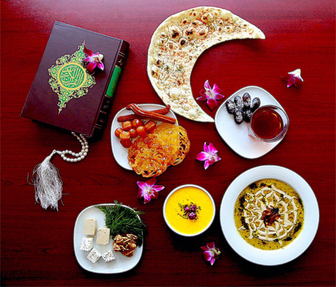
In the holy month of Ramadan, as always, it is necessary to follow a varied and balanced diet, including four main food groups (bread and cereals, fruits and vegetables, meat and legumes and eggs, milk and dairy products). By observing variety and balance in food consumption, nutritional needs including water, salts, vitamins, protein, and energy required by the body are met.
Some common problems in fasting
1) Constipation
Constipation can cause hemorrhoids and indigestion along with a feeling of fullness in the stomach.
Cause: excessive consumption of refined foods such as bread ventilated from Arad white (lavash and fancy bread) and reduced consumption of water and foods containing fiber (fruits and vegetables)
Treatment: avoid excessive consumption of refined foods such as white bread, increase water consumption and use whole grain bread (Sangak and barley bread) and fruits and vegetables
2) Indigestion and bloating
Cause: excessive consumption of fatty, fried, and spicy foods, foods such as eggs, cabbage, lentils, carbonated sugary drinks such as cola cause bloating.
Treatment: avoid fatty foods and carbonated beverages and consume water instead
3) Hypotension
excessive sweating, weakness, decreased energy, dizziness, paleness, and fainting that may occur during the afternoon of the holy month of Ramadan are symptoms of hypotension.
Cause: low fluid and salt intake
Treatment: keeping the person cool and increasing fluid and salt intake
4) Headache
Cause: due to the habit of caffeine and tobacco and stopping it, fatigue and lack of rest and adequate sleep because of high activity or low blood pressure.
Treatment: it is better to reduce the consumption of caffeinated substances and tobacco from 1 to 2 weeks before the holy month of Ramadan (decaffeinated drinks and herbal teas are a good alternative.)
-
During the month of Ramadan, adjust your schedule so that you have enough sleep and rest.
-
If the headache is very severe due to a drop in blood pressure, the fast should be broken.
5) Hypoglycemia
weakness, dizziness, fatigue, lack of concentration, sweating, tremors, decreased activity, and physical strength, headache, palpitations are symptoms of hypoglycemia.
Cause (in non-diabetics): excessive consumption of simple sugars at dawn because it causes high insulin secretion and hypoglycemia during the day.
Treatment: avoid foods and drinks that contain simple sugars
-
Note: diabetics should consult with their doctor and a nutritionist for fasting.
6) Muscle cramps
Cause: inadequate consumption of foods containing calcium, magnesium, and potassium.
Treatment: consume foods that are rich in the above substances such as vegetables, fruits, dairy products (such as milk, yogurt, cheese, and curd), veggies, and dates.
7) Gastric ulcer, heartburn, gastritis, etc.
Cause: increased acid in an empty stomach causes these complications. Heartburn first starts in the upper part of the stomach above the ribs and spreads to the throat area.
Spicy foods, fizzy drinks, and coffee make these conditions worse. Sometimes eating fatty foods can also cause these problems.
Treatment: treatments available to reduce stomach acid levels
-
Note: people with stomach ulcers or gastrointestinal disorders should consult their doctor for fasting.
8) Kidney stones
they may occur in people who drink fewer fluids, so it is recommended that they drink plenty of fluids.
9) Joint’s pain
Cause: increased pressure on the knee joint during prayer, especially in the elderly and people with joint inflammation, causes pain, swelling, and discomfort.
Treatment: lose weight because the knees can not bear the extra weight. Exercise and fitness will reduce pain and make it easier for a person to pray.




